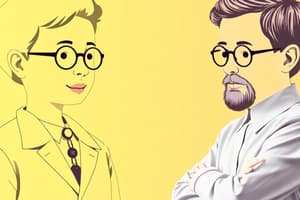Podcast
Questions and Answers
Normal aging typically does NOT include?
Normal aging typically does NOT include?
- Memory improvement (correct)
- Dementia
- Cognitive decline
- Senility
According to Erikson, what is the central conflict of young adulthood?
According to Erikson, what is the central conflict of young adulthood?
intimacy versus isolation
According to Piaget's theory, which stage is characterized by the ability to conserve mass and volume?
According to Piaget's theory, which stage is characterized by the ability to conserve mass and volume?
concrete operational stage
In the preconventional level of moral reasoning, decisions are made based on what?
In the preconventional level of moral reasoning, decisions are made based on what?
According to Freud's psychosexual theory of development, ___________ in one of the childhood stages could cause personality problems in adulthood.
According to Freud's psychosexual theory of development, ___________ in one of the childhood stages could cause personality problems in adulthood.
At what age will a child first recognize herself in a mirror?
At what age will a child first recognize herself in a mirror?
An individual's feeling that the 'right' time to get married is between the ages of 25-32 may be a reflection of what?
An individual's feeling that the 'right' time to get married is between the ages of 25-32 may be a reflection of what?
According to Piaget, what is the basic unit of cognition or mental template called?
According to Piaget, what is the basic unit of cognition or mental template called?
What is the strong bond between an infant and caregiver referred to as?
What is the strong bond between an infant and caregiver referred to as?
If a child recognizes that he can play a trick on his mother by hiding her shoes, what is he demonstrating?
If a child recognizes that he can play a trick on his mother by hiding her shoes, what is he demonstrating?
Flashcards are hidden until you start studying
Study Notes
Normal Aging
- Normal aging does not involve senility or dementia, which are considered abnormal conditions.
Erikson's Conflict
- Young adulthood faces the central conflict of intimacy versus isolation, emphasizing the importance of forming healthy relationships.
Piaget's Stages
- The concrete operational stage is characterized by the ability to conserve mass and volume, showcasing cognitive advancement in children.
Kohlberg's Moral Reasoning
- In the preconventional level of moral reasoning, decisions are primarily influenced by the consequences of reward and punishment.
Freud's Psychosexual Development
- Fixation during any childhood stage, according to Freud, can lead to personality issues in adulthood, highlighting the impact of early experiences.
Self-Recognition in Infants
- Children typically begin recognizing themselves in a mirror between 15 to 18 months, marking a significant developmental milestone.
The Social Clock
- The belief that the ideal time to marry is between ages 25-32 reflects societal norms known as the social clock, which varies across cultures.
Piaget's Cognition Units
- Schemas are the basic units of cognition as defined by Piaget, serving as mental frameworks for organizing knowledge and experiences.
Attachment Theory
- Attachment describes the strong emotional bond formed between an infant and their caregiver, crucial for healthy emotional development.
Theory of Mind
- A child displaying an understanding that they can trick their mother by hiding her shoes demonstrates possession of a theory of mind, indicating awareness of others' thoughts and perspectives.
Studying That Suits You
Use AI to generate personalized quizzes and flashcards to suit your learning preferences.



